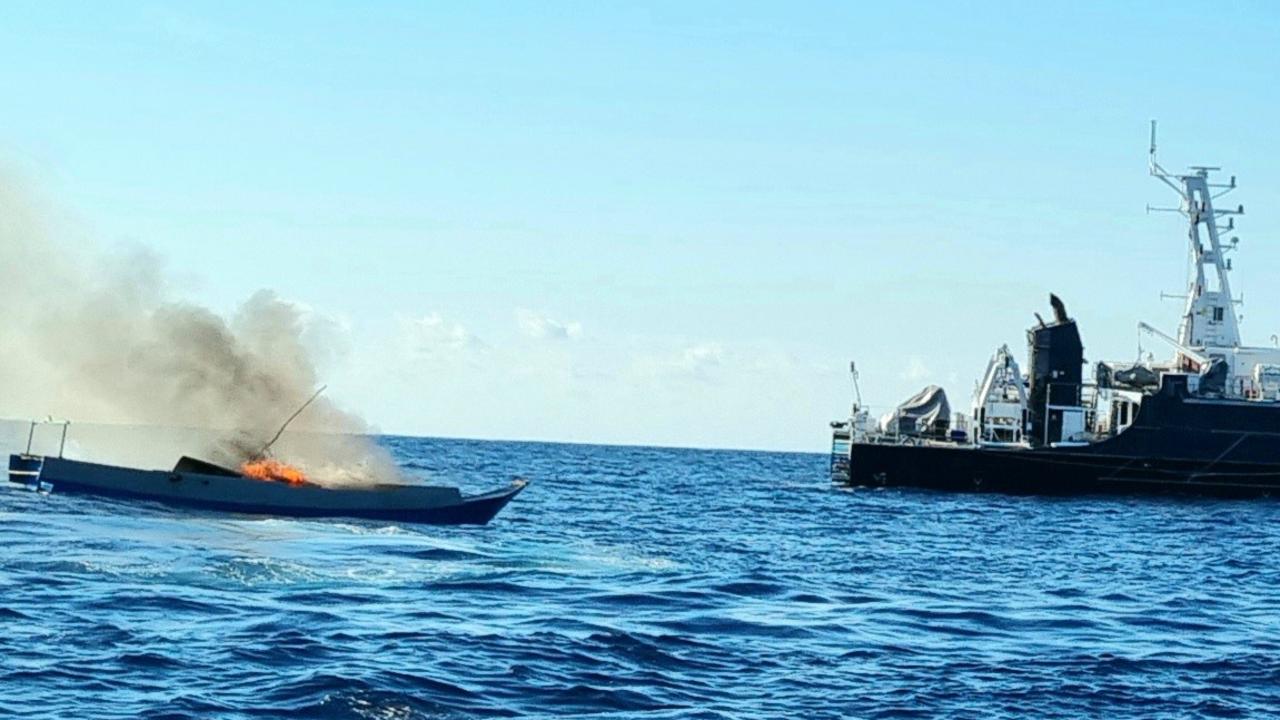


Australian authorities have cracked down on illegal fishing in their waters, arresting 15 foreign fishers and seizing two Indonesian vessels. The arrests were made after detecting and apprehending the vessels allegedly fishing illegally near Deliverance Island in the Torres Strait. The large vessels were equipped with a substantial amount of fishing equipment and will be disposed of by the Australian Fisheries Management Authority. This serves as a warning to anyone attempting illegal fishing in Australian waters, as the maximum penalty for such offenses is two years' imprisonment.
Illegal Fishing in Australian Waters: Arrests, Seizures, and Consequences
In a significant crackdown on illegal fishing, Australian authorities apprehended 15 foreign fishers and seized two Indonesian vessels near Deliverance Island in the Torres Strait. This stern action highlights the government's commitment to protecting its marine resources and deterring illegal activities in its territorial waters.
Background of Illegal Fishing in Australia
Illegal fishing has emerged as a major threat to Australian fisheries, posing significant ecological and economic consequences. Foreign vessels from countries such as Indonesia, Vietnam, and Thailand frequently engage in unauthorized fishing operations within Australia's exclusive economic zone (EEZ).
These vessels often use sophisticated equipment and techniques to harvest valuable marine species, leading to overfishing, habitat destruction, and loss of biodiversity. The illegal catch is often exported to international markets, depriving Australia of fair market value and undermining its sustainable fishing practices.
Recent Crackdown and Consequences
The recent arrests and vessel seizures are the result of ongoing surveillance and enforcement efforts by the Australian Fisheries Management Authority (AFMA). The apprehended vessels were found to be illegally fishing within the Torres Strait, a protected fishing zone renowned for its rich marine ecosystem.
The Australian government takes illegal fishing very seriously. The maximum penalty for such offenses is two years' imprisonment, and seized vessels and equipment are typically disposed of. This serves as a strong deterrent against future illegal activities.
Top 5 FAQs
1. How do Australian authorities detect illegal fishing operations? AFMA employs various methods to monitor fishing activities, including aerial surveillance, satellite tracking, and vessel inspections.
2. What are the reasons for illegal fishing in Australian waters? Foreign vessels engage in illegal fishing in Australia due to declining fish stocks in their home countries and the high demand for seafood in international markets.
3. What is the impact of illegal fishing on Australian fisheries? Illegal fishing undermines sustainable fishing practices, reduces fish populations, and harms marine habitats. It also deprives Australia of economic benefits from legitimate fisheries.
4. What are the consequences for individuals caught illegally fishing in Australia? Persons convicted of illegal fishing face significant fines or imprisonment. They may also have their fishing licenses revoked and their vessels seized.
5. Are other countries involved in addressing illegal fishing in Australian waters? Australia collaborates with neighboring countries, such as Indonesia, Papua New Guinea, and Timor-Leste, to combat cross-border illegal fishing in the region.

President Donald Trump is meeting with leaders of five Central Asian countries to discuss their vast reserves of rare earth metals, while also addressing a key point of friction in ongoing trade negotiations with China. The meeting comes on the heels of Trump's talks with Chinese leader Xi Jinping, where China agreed to delay their new export restrictions on rare earth elements. The U.S. is now seeking new ways to secure critical minerals, and the region is hoping for investment to develop their resources further.

US President Donald Trump has expressed concern over the tone of incoming New York City Mayor-elect Zohran Mamdani's victory speech, calling it "angry" and advising him to adopt a more cooperative approach. In response, Mamdani has urged Trump to "turn the volume up" and vowed to hold "bad landlords" accountable, citing Trump as an example. Trump has hinted at offering limited federal help to New York under Mamdani's leadership, but has also expressed doubt towards the mayor-elect's left-leaning policies. This clash between the two leaders marks a tense beginning to their relationship.

Chief Election Commissioner Gyanesh Kumar flagged off 14 participants from 7 countries as part of the International Election Visitors’ Programme 2025 to witness voting in the Phase-I of the Bihar Assembly Elections. The participants attended an inaugural session and were provided with a demonstration of the EVMs and a presentation on various aspects of elections in India. The participants will then embark on a two-day tour of Bihar to visit EVM dispatch centers and witness the actual polling on November 6. Since 2014, the IEVP has been showcasing the strengths of India's electoral system and sharing best practices with international election management bodies. The first phase of the Bihar Assembly elections, featuring 121 constituencies and over 3 crore voters, will be held on November 6.

The recent police raid in Brazil, which resulted in one of the deadliest operations in Rio's history, has sparked outrage and protests. Families of the victims claimed that their loved ones were executed by the police, while the government celebrates it as a win against crime. Shocking images of bodies lined up in the street have led to widespread protests and accusations of police brutality. However, official reports and videos of victims' bodies suggest that the deaths were not a result of armed conflict, raising questions about the excessive use of force by the police.

Four people have died and 11 have been injured after a UPS cargo plane crashed near Louisville Muhammad Ali International Airport in Kentucky. All flights in and out of the airport have been suspended as police and emergency services are attending the scene. Kentucky governor Andy Beshear has described the accident as "catastrophic" and is urging residents to obey any shelter-in-place orders.

Eight people have been killed and numerous others injured after a passenger train collided with a goods train in Chhattisgarh. The accident occurred in the afternoon, halting train services on the route and prompting the cancellation or diversion of multiple trains. Emergency teams have been dispatched to the scene, with rescue operations ongoing and medical treatment being provided to the injured passengers. Helpline numbers have been issued for convenience, and the railway authorities have assured that all efforts are being made to assist those affected by the tragedy.

Today, 5 November 2025, marks the 556th birth anniversary of Guru Nanak Dev Ji, the founder of Sikhism. As we celebrate this sacred and highly revered festival, let us remember and spread the teachings of Guru Nanak Dev Ji, which promote compassion, humility, and love for all. To commemorate this occasion, indianexpress.com has compiled heartfelt wishes and messages to share with friends and family, wishing everyone endless happiness, peace, and prosperity.

During the Emerging Science Technology and Innovation Conclave, PM Modi announced the launch of the Rs 1 lakh crore Research, Development and Innovation Fund. This fund, under the Department of Science and Technology, aims to encourage private sector investments in R&D to drive India's vision of becoming an innovation-driven nation. With this fund, India's R&D expenditure has doubled in the last decade and the country now has the world's third-largest startup ecosystem. PM Modi also highlighted how India's domestic capability has accelerated during the COVID-19 pandemic due to its successful digital public infrastructure.

A stampede at the Kasibugga Venkateswara Swamy Temple in Andhra Pradesh has left 10 dead and two injured. The temple had recently reopened and was experiencing high footfall due to a festival. Home Minister Vangalapudi Anitha has ordered a thorough investigation into the causes of the tragedy and has promised strict measures to prevent similar incidents in the future.

India and the United States have strengthened their already strong ties by signing a 10-year framework for their major defense partnership. The agreement, signed during a bilateral meeting between the two countries' defense ministers, emphasizes the importance of this partnership in maintaining a free and open Indo-Pacific region. This marks a significant step in solidifying the bond between India and the US in the defense sector.